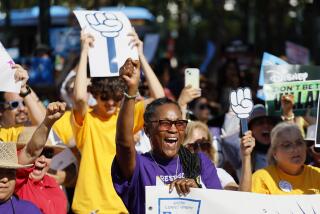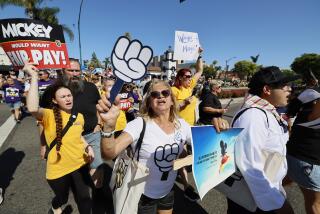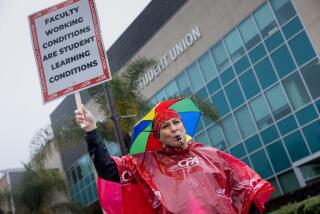Early Voting: Let’s Play : Hockey: Players weigh in on labor agreement, prepare to play once it’s ratified.
- Share via
NEW YORK — In Anaheim’s Glacial Garden Ice Arena, where Mighty Duck players had been wearing their jerseys inside-out during informal workouts to hide the club logo, the masked duck was visible Thursday for the first time since the NHL lockout began 104 days earlier.
As lawyers for the league and the NHL Players Assn. settled the final terms of an agreement that the union’s negotiating committee had recommended to its members for approval, players throughout the league began getting back into shape--and getting rid of animosity they developed toward owners during the long labor dispute.
Players began casting secret ballots Thursday, after a conference call among union representatives regarding side issues that were resolved late in the day. The deadline for approval is 9 a.m. PST today. A majority of the union’s approximately 700 members must approve in order to ratify the six-year agreement and officially end a dispute that threatened to cancel the season.
An NHLPA spokesman said each team’s union representative would count his team’s votes and report results to the association’s Toronto office. Some players were faxing their votes from Europe, but most who had gone overseas to play were due back Thursday or early today.
Ratification is expected, although players anticipated 100 to 200 protest votes by those who resent new restrictions on salary arbitration and the introduction of a rookie salary cap.
“I won’t say it’s a done deal, but it should be an overwhelming majority,” said Duck forward Stu Grimson, who volunteered his home as a polling place. “Within our organization, there won’t be hard wounds to heal. It’s a professional bunch. We have to turn our focus to playing. We have to continue working on what we’ve accomplished so far.”
Said Terry Carkner, Detroit Red Wings’ union representative: “One item that must be stressed is we were told to explain the importance of there being no tax and no cap in the agreement. We were completely against that. . . . We have to remind the guys that a ‘no’ vote means you want the season to end.”
If the agreement is ratified, NHL Commissioner Gary Bettman and Bob Goodenow, executive director of the NHLPA, will sign it at a news conference today in New York.
The season, which has been shortened from 84 games to 48, will begin next Friday. The league has not released a comprehensive schedule, although it sent each club a preliminary schedule for approval and revision. The final version might not be released until Saturday.
Teams will face only opponents in their conferences. One possible plan for the Western Conference had teams in the Pacific Division playing each of the six Central Division teams three times and playing the other five Pacific teams six times.
Formulating a schedule for the Eastern Conference is troublesome because it consists of 14 teams, and that number doesn’t divide easily into 48.
To schedule as many games as possible into the 101 days allotted for the regular season and minimize travel for far-flung Western teams such as the Red Wings and Toronto Maple Leafs, the schedule probably will have teams playing two consecutive games in the same city within three days.
While the schedule-maker fretted, the lawyers completed work on the transitional issues Goodenow and Bettman had not resolved Wednesday.
Those issues include when players will begin receiving paychecks--an NHL source said players will be paid soon after they report to camp--and how to treat those who would have been eligible for arbitration or free agency under the old collective bargaining agreement but would not be eligible under the new agreement.
It’s believed players will be “grandfathered” so that none will lose a right this season that he would have been entitled to under the old agreement.
The most notable example is 50-goal scorer Cam Neely of the Boston Bruins. Under the old agreement, he would have been a free agent and the Bruins would have had the right to match offers made to him, but not the right to receive compensation if he signed with another team. Under the new agreement, they would be entitled to compensation. If he is grandfathered, however, the old rule will apply.
The same is expected for New Jersey Devil goaltender Martin Brodeur, last season’s rookie of the year. Under the new agreement, players drafted at 18 must play under a three-year cap, followed by two years in which they are ineligible for salary arbitration. Brodeur, who was drafted in 1990 and is beginning his third professional season, had filed for Group 1 free agency, but that category no longer will exist.
Other issues left for the lawyers to resolve included the NHL’s first drug and alcohol policy, disciplinary procedures, international licensing and the details of medical and dental plans. Players were angered when the NHL stopped paying premiums on their medical and dental plans early in the lockout.
Staff writer Elliott Teaford contributed to this story from Anaheim.
More on the NHL Strike
* Times coverage of the strike from early August to the latest news on the proposed NHL agreement is available on the TimesLink on-line service. Or, call TimesLine at 808-8463 and press *3000.
More to Read
Go beyond the scoreboard
Get the latest on L.A.'s teams in the daily Sports Report newsletter.
You may occasionally receive promotional content from the Los Angeles Times.







